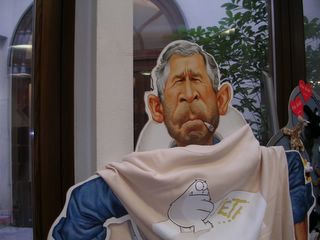The NYT reports on a Dutch soccer team that inexplicably has been come to be known as "Jewish," that receives anti-Semitic taunts from rival team fans, and that embraces some bizarre soccer-hooligan interpretation of Jewish and Israeli culture. The Times finds this bizarre; can't say I do. That a Dutch team is called Jewish seems no weirder to me than that a Cleveland, Ohio, team should be called "the Indians." Neither is especially PC, both rely on the fact that the groups the teams are chanelling have been knocked down so many times that they remain, in the public consciousness of the respective countries, largely as relics of the past, as icons and not as individuals.
That said, I still have this defense of political correctness to write. It might end up being a Maroon column rather than a blog post, but either way, any day now...
Tuesday, March 29, 2005
Dutch soccer "riddle"
Posted by
Phoebe Maltz Bovy
at
Tuesday, March 29, 2005
0
comments
![]()
Jet-lagged and up nice and early...
Well, come one, come all, to the "What is Feminism?" panel discussion (this Monday, April 4, at 7 p.m., in Stuart 101) where I'll be giving a 5-7 minute speech, or so they tell me.
They (a different they) also keep informing me that I am managing editor of our "conservative"-but-not-really-conservative campus journal. I have yet to learn what this will entail, other than "managing" and doing something different with the collar of my polo shirts (made all the more complicated by the fact that I don't really wear polo shirts, not since the nine years I was forced to do so). Oh well, should be interesting.
And, in tangentially related preppy news, Matthew Yglesias's observations about income disparities at Dalton ("I went to an expensive private high school where all but a tiny handful of scholarship students must have been from families in the top one or two percent of the income distribution spectrum. In one sense, then, it was an incredibly narrow slice of American society. Nevertheless, the level of inequality in family income present among the population of Dalton parents has to be much larger than that on display in a normal school."), all true of Spence as well. Basically, Spence didn't have middle class kids. This was something of a problem for me, since my family's lack of car or country house, yet the fact that we lived in an upscale part of Manhattan, put us between the scholarship families and the Bloombergs, etc. There were a few other families like my own, and those of us kids who knew our bubble sheets ended up at Stuyvesant or Hunter, places (at least Stuyvesant) where anything goes. But we were oddities, neither the admirable Prep for Prep kids nor the folks who, by middle school, were making regular appearances in socialite magazines. Was it a hard life? No, but a confusing one.
But what was so strange, on a more general level, about Spence's lack of middle class was that the kids I knew (this was middle school; things may change in high school) were not for one second aware that they weren't "normal." The non-scholarship kids assumed that their families were about average, and that anyone who went to public school, any public school, was an impoverished resident of a slum, most likely located somewhere in one of those mysterious outer boroughs one might pass on the way out to the country.
A recent Spence Bulletin included a letter second-graders had written to then-President-Elect Clinton, in which the girls, in polished kiddie handwriting, urge the President to help the public schools, which are unfortunate and unlike the private schools, where everyone has everything they need or want. The wording the girls used in this letter was patronizing to the point of being cringe-worthy. The girls took for granted that all public schools are inner-city public schools (odd, given Spence's proximity to Hunter) and that we really ought to help them. Does the average public school need more help than Spence does? Sure. But did Spence second-graders really need to be given the impression that anyone who goes to a public school is in need of charity and, worse, sympathy?
Posted by
Phoebe Maltz Bovy
at
Tuesday, March 29, 2005
1 comments
![]()
Monday, March 28, 2005
"Here's your strudel, you... American"
Some random stuff left over from my nearly-Internet-free week:
1) It's not so good to be an American, at this moment in history, who does not speak the language of the country in which she is a tourist. In Vienna, I got to be one of those Americans who never bothered to learn anything but English. (My German is limited to thanking a waiter for handing me apple strudel.) That I know French as well, and can semi-communicate in Italian and now Hebrew, hardly matters. I actually considered going into cafes and claiming to only speak French, just to see if that would get a different reception than speaking English, but didn't bother. The speed-B.A.-writing will offer plenty of opportunity to revive my knowledge of that language...
2) Matthew Yglesias revisits Green Day's "Dookie." That album reminds me of sixth grade, when the cool kids dyed their hair with Kool Aid and when I still bought tapes--my "Dookie" was a tape, and it's probably buried somewhere with beat-up Doc Martens and other relics of that bygone era. Interschool dances were sort of eh, making Green Day a definite highlight of that time. Yglesias also suggests more quinoa-blogging, which is a message that the New York Times, for one, has long-since heard. The audience is out there. Does Marian Burros have a blog?
And, in the What Would Phoebe Do? department:
3) A history class about the left or a cross-listed class about religion and the First Amendment? Much depends on which has space open. But I'm a senior, and, as Rizzo said of being a senior, "we're gonna rule the school," so that may not be the deciding factor.
4) When I finally mobilize myself and get to a nearby coffee shop, should I get a cappuccino or an iced coffee? It's sunny, and warm when you're walking but chilly when you're standing still. Another thing to consider is the temperature inside the coffee shop itself. Can't remember offhand if there's a difference in price (it's been a while since I've ordered things "iced" in Chicago) but that might also be something to consider.
Posted by
Phoebe Maltz Bovy
at
Monday, March 28, 2005
1 comments
![]()
The quarter has officially begun
Not only am I at the Reg, but I just a saw a (surprisingly nice-looking) man picking his nose while using a nearby computer. Hurray for Chicago, where even the hot people are just a little bit off.
Posted by
Phoebe Maltz Bovy
at
Monday, March 28, 2005
0
comments
![]()
Comparative literature (and cinema)
Over the course of many flights, I had a chance to read many fashion magazines. Well, three: Vogue, Elle, and upstart Nylon. Between the three magazines, two had profiles of Beck, at least two made a fuss about Jonathan Safran Foer, and all, as far as I could tell, showed the same clothes. Nylon, however, is apparently for hipsters (or possibly just for teenagers, given that many teenaged stars were interviewed for the issue). This means that new bands are mentioned, and that the models wear the same designer outfits as in Vogue or Elle, but without any glamor or subtlety. At one point, Nylon basically orders its readers to buy trench coats. The more established magazine would just assume its readers understand that, if an item of clothing is shown within its pages, then you're being urged to buy it.
Vogue and Elle, on the other hand, were more or less indistinguishable, except that Vogue's latest is the "Shape" issue, which means that identically-built A-through-D-list celebrities were divided, in what seems like an almost arbitrary fashion, into the following categories: short, tall, curvy, pregnant, and--get this--thin. How does one dress to compensate for the unfortunate fact of having been born skinny? That Vogue is, year in and year out, devoted to this very problem is ignored. We instead get a too-long article by Cameron Diaz about how tough it is to effortlessly thin. As with most such articles, we get the whole, "kids teased me, kids are cruel," line. We also, strangely, get to hear about how desperately she wished (and still wishes!) she were fatter. This all might be slightly believable (the coexistence in this society of ways to straighten and curl hair suggests that different people want different things) were it not for all the accompanying photos of flawless Ms. Diaz, in various skimpy outfits, reminding us that, effortless or not, her body brings her fame and money, and should she reach the point where she gets that bit of flesh around the belly she claims she so desires, that money and fame would not last long. At the end of the piece, Diaz urges women to love their bodies for what they are. Oh well.
That, though, was not the peak of airplane-entertainment dippiness. On one of my flights, I had the chance to see what may well be the two most white movies I've ever seen. Now, I am, by most accounts, white, so I'm probably not supposed to notice such things, but Wimbledon really pushed things to the limit. Wimbledon is a movie lacking both pigment and plot. In the film, a very blond guy (like, he might have benefitted from some mascara) meets a very blond girl, and they play a whole bunch of tennis. There's never any real doubt that the two will both live happily ever after and win all the important matches in which they play. The villains (i.e. rival tennis players) and goofballs (a divorced, money-grubbing tennis agent) of the movie can all be identified by their darker coloring. At the end of the movie, I turned and noticed that the preppy middle-aged woman sitting next to me had tears welling up in her eyes. Kirsten Dunst and the British guy finally spawned! And he won Wimbledon! This was just too much excitement, it seemed.
Then (this was a long flight) came First Daughter, the story of Katie Holmes and her uncomfortably close relationship to a man playing, at one and the same time, her father and the president of the United States. That Holmes is maybe 30 and the actor playing her father perhaps 40 makes all their cutesy late-night bonding scenes more than a little creepy. Also unsettling was the subplot of Holmes's roommate, a black girl with attitude (as opposed to Holmes, who's got some tasteful stud earrings, shiny hair, and little else) who doesn't like that Holmes, as the president's daughter, takes her out of the spotlight. The roommate is chided, by both Holmes's character and the film itself, for a) demanding attention, and b) kissing too many boys, all of whom, needless to say, are black. She does not, in effect, know her place, but at least she has the decency to stick with her own kind as Holmes does the same. Ick. During this movie, I should add, the woman next to me was equally involved in the proceedings, and looked up at the screen with her hands almost in prayer, waiting to see if things would turn out for this J. Crew-personified heroine.
Posted by
Phoebe Maltz Bovy
at
Monday, March 28, 2005
1 comments
![]()
Foreign Policy: North Korea
Well I've had my snarky say about US foreign policy and it's time to back this up with some substantive foreign policy discussion. I'll start--in a risky move--with North Korea.
What inspires my post is a quote from Richard Perle, a well-known neocon hawk who, though he has no actual role in the government, is rather well connected to a number of neocon think tanks.
Mr. Perle said the following in an interview with PBS's Frontline:
Question: [The Clinton Administration's policy of engagement] was a policy that was advocated by the South Koreans, under Kim Dae Jung. Kim Dae Jung came to Washington, for instance, early on in his administration and felt rebuffed by President Bush.
Answer: I think Kim Dae Jung's interests, and the interests of the South Koreans, are not at all identical to ours. They have an interest in doing everything possible to avoid military conflict, and it's understandable. Seoul is within artillery range of thousands of North Korean artillery tubes. They would much prefer to take a risk that North Korea will become not only a nuclear power, but the nuclear bread basket of the world, building and selling nuclear weapons, as they are now building and selling missile technology, and anything else they can lay their hands on.
From the South Korean point of view, that is a lesser immediate threat than artillery landing on Seoul. So it's hardly surprising that the South Koreans are going to see this differently from the way we see it. But our president has, first and foremost, a commitment to the security of the United States.
The reason this quote is important is because it indicates the logic for the policy of non-engagement which currently underlies U.S. foreign policy towards North Korea. Since the end of the Clinton Administration, there's been little actual talking going being done on what is a very real issue: the imminent threat that North Korea will gain nuclear weapons, and, with nuclear weapons in hand, use them against South Korea, or, even worse, given them to terrorists.
Like it or not, U.S. foreign policy for the last fifty years has been built on the premise that the interests of South Korea and the U.S. are one and the same. We currently have thirty-seven thousand troops in South Korea. They're not there to simply sit and promote "regional stability." They're there to directly counteract and potential threat against North Korea. They're the tripwire which ensures American commitment to North Korea.
Perle's logic that somehow the South Koreans have no interest in a de-nuclearized North is absurd; of course they want a de-nuclearized North. The United States could pull out those 37,000 troops at any moment, leaving South Korea with nothing (and, in fact, we're doing just that). A nuclearized North essentially ends any hope at re-unification between North and South that includes any semblance of democracy or capitalism, barring some amazing change of heart by a future North Korean leader. And while the South Koreans may be less worried about the threat posed by nuclear proliferation into terrorist hands, the idea that somehow U.S. interests are very different from South Korean interests is absurd.
But what's most worrying about Perle's logic is that it sets up a straw man, essentially claiming that any sort of engagement on any terms other than the U.S.'s terms is "appeasement." But let's evaluate the other side of this straw man. Say he's right. Say appeasement isn't the answer. So now what? If appeasement isn't t he answer, it's time to act militarily! If you're not going to pursue non-peaceful means of keeping someone from nuclear weapons, you have no choice but to (a) act militarily (b) abandon your goals, and wait while the DPRK develops nuclear weapons.
What the Bush administration seems to lack is an understanding of the idea that it's not in North Korea's interests to de-nuclearize: it's in ours. Though the average North Korean might benefit from democracy, capitalism, and an open society (the lack thereof apparently excuses our label of "axis of evil") the average North Korean is also completely alientaed from any ability to effect change in his government. The decision-maker in DPRK is Kim Jong-Il, and it's him we have to deal with. If we're to deal with him, we have to make it worth his while to de-nuclearize, or wait until he does and use nuclear deterrance.
A dangerous game Mr. Bush is playing, talking out one side of his mouth about the need to stop nuclear proliferation, and on the other side doing little to stop it. Though his tough rhetoric may have helped win him an election, I wonder how it's helping us deal with this very real threat to national security.
Posted by
Nick
at
Monday, March 28, 2005
1 comments
![]()
Back, Part II
Several buses, taxis, planes, countries, and states later, I'm back in Chicago. Blogging and emailing will resume shortly.
Posted by
Phoebe Maltz Bovy
at
Monday, March 28, 2005
0
comments
![]()




























